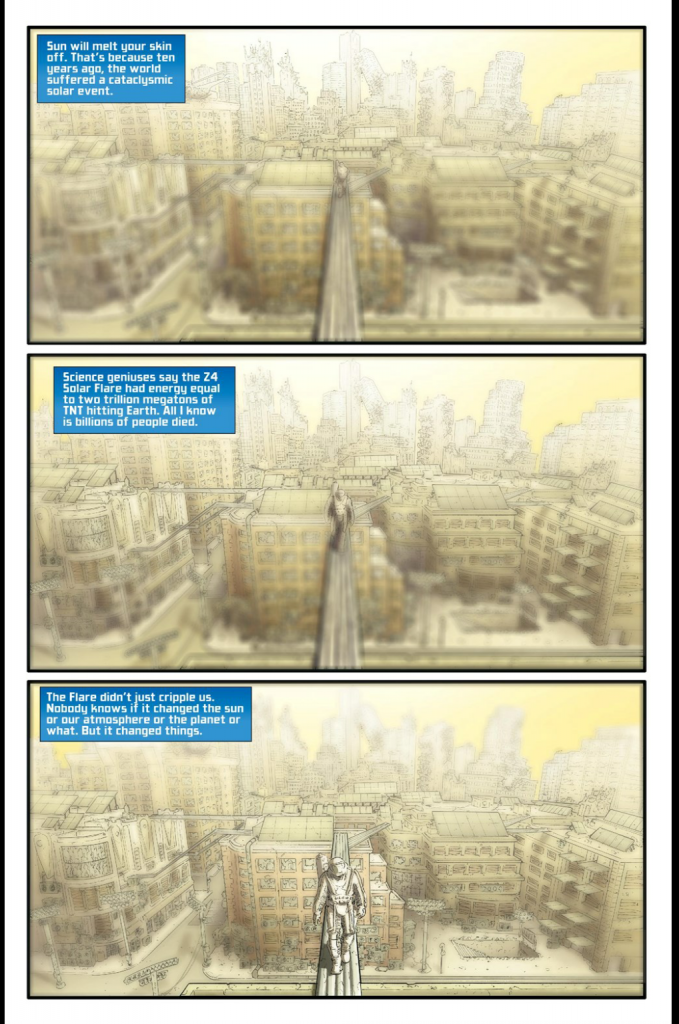Eclipse
Since most of us had the excitement of experiencing the first (almost in my area) total eclipse of the sun in awhile, I thought this week would be a good time to take a look at one of Image Comics’ newer titles, also named Eclipse. In this near future science fiction story, sunlight has become fatal for humanity and society has turned into a less pretty version of itself. Any time you have an event like a solar eclipse, an event that in previous ages, we thought meant the end of the world, it’s hard not to think about the darker potential futures in store for us. Eclipse, written by Zack Kaplan and illustrated by Giovanni Timpano, is much more about how people react to such an event than about the event itself and its conclusions are generally not bright ones. The series was first published this time last year and is an ongoing series that has since been collected into two volumes, which is what I’ll be discussing today.
Eclipse takes place sometime in the near future, after an undetermined solar event caused catastrophic damage to the inhabitants of Earth. Forced to avoid sunlight or risk dying a painful and immediate death from the radiation, humanity has been forced into the shadows, both figuratively and literally. Ten years after the event, with many dead, society has changed completely. Anyone who wants to survive does so in homes and towns built underground or only wander the above-ground parts of the city at night. With the disruption of normal daily life, stability and governing have also disappeared. In its place, the strongest determine the course of society. In New York City, it is the solar company Solarity which now is in charge of the city, employing both police officers and firefighters who now use suits specially designed to protect them from solar radiation. A curfew ensures that the residents of the city do not risk frying themselves during daylight hours. But no system is perfect and when a serial killer starts hunting citizens and using sunlight to kill them, a disillusioned solar engineer named David Baxter and the daughter of the president of Solarity, Rose Brandt, must band together to prevent the killer from taking any more lives. Especially since the next life he intends to take is Rose’s.
Eclipse is a rather frustrating story to read. As far as environmental catastrophes in science fiction go, this concept had serious promise. Particularly given that many of us were getting excited about the total solar eclipse, it is the perfect time to think about the less savory possibilities that such an event could imply. Unfortunately, the devil’s in the details and Eclipse just doesn’t have enough of them. Details that is. That metaphor got away from me a bit but my point is that Eclipse is a story which just doesn’t hold up under scrutiny. I am usually the last person to complain about getting facts in science fiction correctly but there are some whoppers in this series. To start, Kaplan never bothers to identify what the solar event was exactly or how it turned solar radiation deadly. I don’t need a minute explanation but something beyond “it just happened okay?” would be much appreciated. In fact, not only does Kaplan NOT identify it, he just assumes readers won’t care.

Sooo..anybody’s guess? I find it irritating that they have scientists who investigate all manner of things but not what the solar radiation is actually doing. Also, there was an astounding amount of vagueness about why it only affects people and not say, buildings or creatures. I’m not even a science geek and this annoys me!
While the excitement of the hunt for the killer (and then the aftermath in the second volume) could be interesting, it’s distracting to have some poorly written detail sidetrack you in the middle of reading it. There’s a point at which it’s argued that one of the characters can’t be a killer because he’s “a family man.” I’m sorry, but being a father has absolutely nothing to do with your ability to kill people. I mean, Nazis still had kids and had fun with their families and then went off and murdered a whole bunch of people. Same can be said of a fair number of real life serial killers. It’s just a stupid thing to say. While some of the characters are mildly interesting, too many of them feel like stereotypes. Eclipse doesn’t have the worst writing I’ve ever seen but it has a frustrating amount of holes and lack of detail for an intriguing concept. The art by Timpano is serviceable but not anything to write home about.
It’s noted in the first volume that Eclipse is the first book that Zack Kaplan has written. Not to be too critical, but it tells. I think Kaplan has come up with an interesting concept but never fully developed it nor made me care enough about the characters to be as intrigued as I should have been. I wouldn’t mind checking out other books that Kaplan writes in the hope that he irons out some of these flaws but Eclipse just didn’t do it for me. It may appeal more to people not bothered by small details like these so if you want to see environmental catastrophe meets government conspiracy, Eclipse may be up your alley.
– Cait



